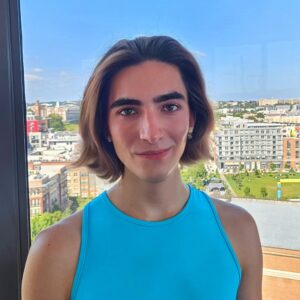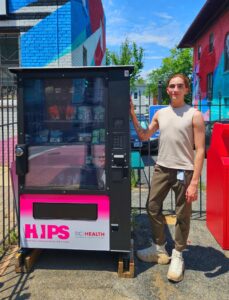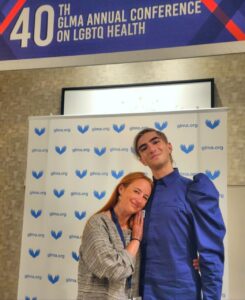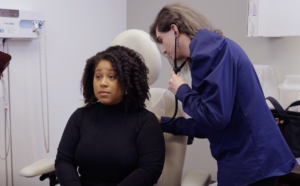Sponsored Content
How Physician Associates Can Qualify for Student Loan Forgiveness
December 10, 2024
“Regardless of political, professional, or personal beliefs, we all need to care for these people”
June 17, 2024
By Dave Andrews

Improving quality of care for patients and advocating for equity among health professionals are seemingly two different objectives. For Jona Tanguay, MMSc, PA-C, AAHIVS, medical program lead for substance use disorder treatment at Whitman-Walker Health, the two goals go hand in hand—especially when they pertain to people who identify as LGBTQ+.
In Tanguay’s full-time role at Washington, D.C.-based Whitman-Walker, they specialize in helping people with intersectional identities by expanding medical and harm-reduction services, particularly for those who use drugs. And with their unique perspective as a transgender health expert, Tanguay has successfully led several initiatives as a board member of GLMA: Health Professionals Advancing LGBTQ+ Equality (previously known as the Gay & Lesbian Medical Association).
“I like to feel as though I’m helping to affect change across a wide spectrum,” Tanguay said. “I want to not only make an impact on an interpersonal level while at the clinic interacting with patients, but also on a national level to change some of the policies that are adversely affecting queer communities.”
Taking every opportunity to affect change, Tanguay also makes time to give lectures as an adjunct faculty at Yale University’s School of Medicine, travel to various speaking engagements, and provide guidance as associate medical director for transgender health at Amida Care, a special needs Medicaid program.

With such a long list of obligations, Tanguay says the drive to keep going comes largely from seeing their patients find solutions and reassurance, whereas before they often felt stigmatized and ostracized.
“I’m so grateful for the experiences I’ve had so far because I see how impactful we can be in the lives of people who need our help,” Tanguay said. “Many of our patients are brought to tears of joy and relief because they’ve finally found providers who can help after they’ve had to cycle through all kinds of medical trauma before they wound up at our door.”
Normalizing the Difficult Conversations
From Tanguay’s perspective, there is a lack of familiarity with the queer community among some providers. As a result, the unique needs of their LGBTQ+ patients can be overlooked or go unspoken about in a medical setting. Tanguay advocates for a different approach, emphasizing open and candid communication regardless of the difficulty of the topic.
“Jona is incredibly talented at finding ways to normalize those difficult conversations,” said Jennifer Loken, MSW, LICSW, director of therapy and substance use disorder treatment at Whitman-Walker. “For example, one of the things I appreciate most about what Jona does is that they are so open and encouraging with other providers to be talking about chemsex, which is the intersection of substance use and sex. When people become more educated about these topics through primary care, they can more safely enjoy [social] spaces and find their community.”
As the queer community continues to grow each year, Tanguay believes the need for providers to become trained on issues related to LGBTQ+ health has never been greater. According to the latest polling from Gallup, 7.6% of American adults identify as LGBTQ+, a portion that has more than doubled in the last 12 years.
“We’re seeing more and more programs requiring LGBTQ+ healthcare to be taught as part of medical training,” Tanguay said. “It takes time for programs to build up that content, but I think we’re going to see a lot of progress in that regard within the next five to 10 years.”

Tanguay also predicts LGBTQ+ healthcare will soon no longer be considered a specialty, but rather a standard component of healthcare education that all providers are taught. Tanguay has even noticed an uptick in the number of schools that are considering expanding LGBTQ+ healthcare curriculum.
“That’s another sign for me that the winds are changing, and more people are recognizing this is something they’re going to run into,” Tanguay said. “Regardless of political, professional, or personal beliefs, we all need to care for these people because in healthcare we don’t get to choose who we care for; we have to care for everyone.”
Pushing for Equity Among Health Professionals
Having served in several clinical volunteer roles in various healthcare settings before finishing PA school, Tanguay has also witnessed systemic inequities facing LGBTQ+ health professionals.
“As I began my journey into healthcare, I realized that not only were queer patients not being served in a manner that I thought they should be, but similarly, many [clinical] spaces were becoming less and less friendly to queer providers,” Tanguay said.
Recognizing that advocating for their fellow providers would be just as important as caring for patients, Tanguay got involved with the GLMA. The organization focuses on ensuring equity for the tens of thousands of LGBTQ+ health professionals across the country.
After excelling in committee chair positions and successfully overseeing GLMA’s educational initiatives, Tanguay was recently selected as GLMA’s president-elect and will soon become the first PA to serve as its president in the organization’s 43-year history.
“Jona has a very unique perspective as a PA working in this space with so many different LGBTQ+ community members, including patients, health professionals and their families,” said Alex Sheldon, GLMA’s executive director. “Working with Jona in this capacity will be amazing because of their on-the-ground clinical expertise, passion for advocacy, and ability to really push the envelope.”

Making Progress Despite the Headwinds
Among their collaborative achievements, Sheldon and Tanguay successfully advocated for updates to the National Provider Identifier (NPI) database that would enable people to change their names and genders in their profiles, including the addition of an “X” gender marker for non-binary people. Tanguay began this advocacy push in 2021 after becoming frustrated at the inability to have an NPI number that reflected their identity documents.
The updates to the NPI were a significant advocacy win for GLMA and all LGBTQ+ health professionals.
“I certainly hope the momentum will continue,” Sheldon said. “We’ve seen an incredible change within certain pockets of the country thanks to a lot of work from our allies and very dedicated health professionals.”
However, Sheldon notes that often the increased visibility and representation in media and politics bring a “backlash” from other groups that are resistant to change.
“We have a steep road ahead of us and there will be a fight at every level of government,” Sheldon said. “That’s exactly why we continually need more representation, more disciplines and specialties within healthcare, and more people like Jona who are passionate about inclusivity and treating everyone with the dignity and respect they deserve.”
You May Also Like
AAPA Diversity, Equity, and Inclusion Resource Center
After Battling Brain Cancer, PA Student Melanie Shojinaga On TikTok, Her Career Goals, and Her Advice for PAs
2024 PA Student of the Year Advocates for Inclusivity and Interprofessional Collaboration
You have 2 articles left this month. Create a free account to read more stories, or become a member for more access to exclusive benefits! Already have an account? Log in.